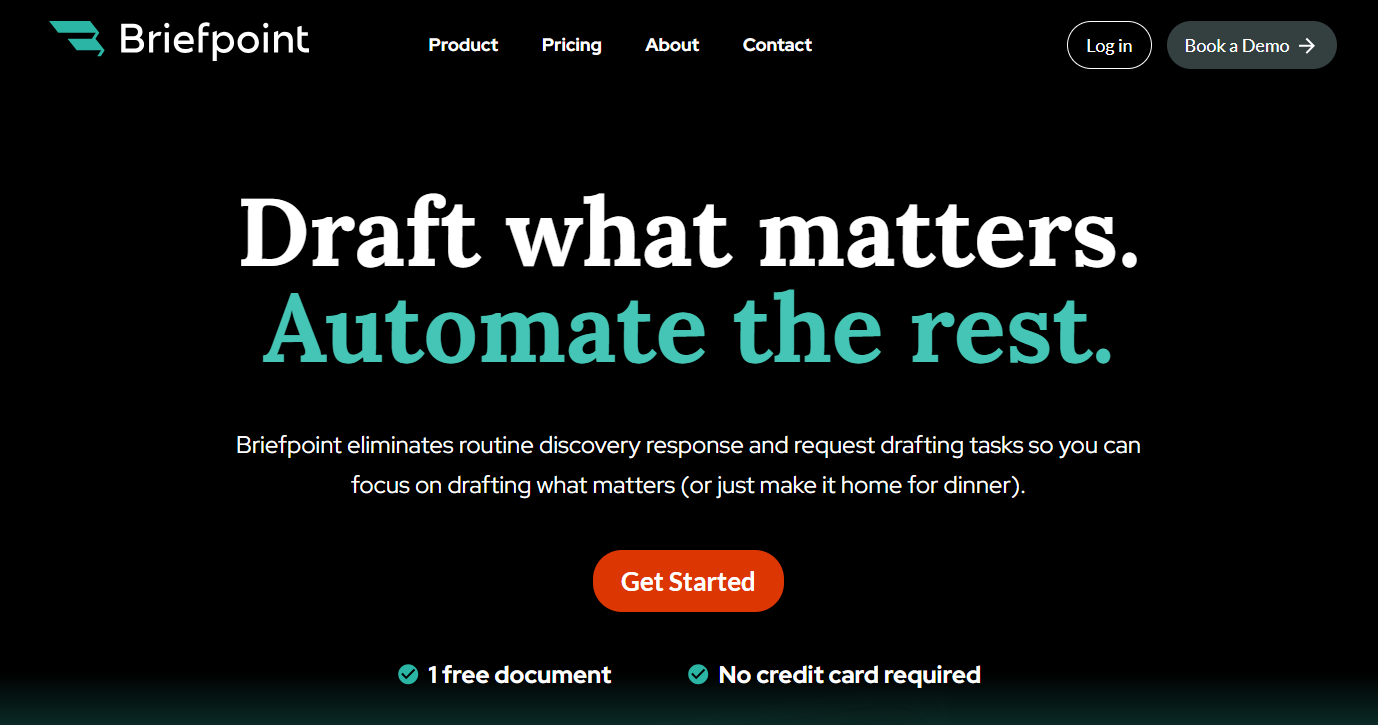7 Features to Look For When Choosing Litigation Support Software
7 Features to Look For When Choosing Litigation Support Software
Litigation management software is designed to make life easier for law firms, mainly those that handle the often complicated and long-winded litigation process.
In its most basic form, this kind of legal software takes over the bulk of administrative tasks like document preparation and scheduling.
However, as legal technology progresses, litigation management software has become a multi-faceted tool that can handle almost all aspects of legal work.
All that said, not all litigation management systems are made the same. In this guide, we’ll highlight some of the most important features your litigation management tool should have, and how to choose the right one.

What is Litigation Support Software?
Litigation support software is a tool that helps lawyers and legal teams manage their cases more efficiently.
Basic software helps organize case information, manage documents, and handle other routine legal matters. More advanced or task-specific tools can perform more niche tasks like discovery document preparation and litigation research.
Either way, these tools aim to make everything from research to trial preparation smoother.
7 Features to Look For When Choosing Litigation Support Software
Choosing the right litigation case management software is not as complicated as you may think. In fact, it becomes very simple once you know what to look for.
Start by looking for a tool that solves any specific problems that you may have. Still, your litigation management software should have the following features:
1. Comprehensive Document Management
Good software should make it easy to keep all your files organized—from court documents to filing deadlines.
Features like advanced search, easy version control, and secure sharing can save you a ton of time. This way, you’re not digging through files, and everyone stays on the same page with the latest updates.
2. Simplified Case Management
You’ll want a system that helps manage every part of a case, from start to finish. This means keeping track of important dates, all the people involved, and detailed records of what’s happened.
Automated reminders, easy access to client information, and centralized platforms help lawyers manage their cases more efficiently.
This level of organization can help everyone in the legal team stay on top of deadlines and avoid the issues that come with time mismanagement, such as dissatisfied clients and wasted resources.
3. Integration with Existing Systems
Top-notch software integrates seamlessly with existing systems within the law firm, including accounting software and communication tools.
This integration helps simplify tasks and reduces the need to juggle multiple systems.
4. Intuitive Communication Tools
Look for software that helps keep everyone connected. Whether it’s updates for your team or communications with clients, real-time info and easy sharing options mean no one’s left out of the loop.
Focus on features like client portals, real-time updates, mobile accessibility, and integration with email and other communication tools.
5. Automation of Routine Tasks
Automating routine tasks is one of the most valuable features of effective litigation support software, as it can simplify your legal workflows and minimize the administrative burden on your team.
Automation involves using software to handle repetitive and time-consuming tasks that would otherwise require manual input from staff.
This frees up your team members to focus on more complex, strategic aspects of their work that require human judgment and expertise.
For example, automation can manage scheduling by syncing with court deadlines and automatically reminding team members of important dates, ensuring nothing gets missed. This can include court appearances, filing deadlines, and internal review dates.
It can also extend to document handling, such as auto-generating standard legal documents based on templates, filling in client information where needed, and even drafting correspondence or routine legal filings.
6. Security and Privacy
When it comes to litigation support software, robust security and privacy measures are non-negotiable. Given the sensitive nature of legal data, the software must be equipped with top-notch security features to protect against data breaches and unauthorized access.
Make sure that the software uses strong encryption for both data at rest and data in transit. This means that your files and communications are encoded and can only be accessed by individuals with the correct decryption keys.
Plus, it should allow you to set detailed user permissions. This feature helps control who can see what information, ensuring that only relevant team members have access to sensitive data.
7. Customization and Scalability
Every law firm is different, so flexibility in software is a must. A customizable platform allows you to tailor features, workflows, and interfaces to fit the specific requirements and preferences of your team, which helps improve usability and efficiency.
For instance, you might want to configure dashboards to display critical information specific to each user’s role or create custom forms and fields that match the data you typically handle.
Scalability is equally important as it makes sure that the software can grow with your firm. As your practice expands, you may take on more complex cases or increase your team size.
Scalable software can handle an increasing amount of work and additional users without performance degradation.
This means you won’t need to invest in new software every few years as your firm grows; instead, the same platform can expand its capabilities.

How to Choose the Right Software Provider
As we’ve mentioned before, litigation management software can vary in quality. Here are several factors to consider when looking for the right litigation management software:
Understands Your Needs
The ideal provider understands law firms’ specific needs. They offer tailored solutions that handle everything from court dates to the discovery process and ensure their software aligns with your administrative tasks and litigation management.
Offers Good Support
Effective support is vital. The right provider responds quickly when issues arise to help maintain smooth operations. This continuous support is a must-have for minimizing disruptions and maintaining client satisfaction.
Grows With You
As your law firm expands, your software should adapt effortlessly. Look for a provider whose software can scale up to accommodate new cases, clients, and changes in court rules without a hitch.
Trustworthy
Choose a provider with a solid reputation in the legal industry. A provider trusted by other law firms indicates reliability and quality, which signals that you’re making a sound investment.
Gauge a provider’s reliability and reputation by reading reviews, consulting other legal professionals, and taking advantage of free trials.
Implementation of Litigation Management Software and Training for Staff
Selecting the right legal tools is just the beginning–the next step is to implement them into your practice with as little friction as possible. Good litigation management software should meet the following criteria:
Teaches Everyone
It’s important that the training covers all staff members, not just a select few. Everyone should understand how to use the new system to make sure a comprehensive solution is effectively used across the firm.
Fits Your Schedule
Training sessions should align with the firm’s operational hours to avoid disrupting daily activities. Well-planned sessions make sure that learning the new system doesn’t interfere with the firm’s legal services.
Goes Step by Step
A step-by-step training approach prevents information overload. Trainers should break down each feature of the software to make it easier for staff to absorb and apply the information.
Supports Users
Post-training support is just as important as the initial sessions. Staff should have access to ongoing help to address any questions or issues as they use the software so that they feel confident and supported at all times.
Choosing Your Litigation Management Software
The discovery process is one of the most tedious parts of litigation, and it often consumes hours of work that could have been spent on other valuable tasks. The most time-consuming part of it all? Discovery document preparation.
Briefpoint provides a comprehensive solution to this problem. With generative artificial intelligence, it lets you draft discovery responses and request documents in minutes.
Simply upload your documents, insert your objections or responses, and then finish it up on Word.
Briefpoint also comes with Bridge, a built-in feature that lets you select the interrogatories that need your client’s responses, translate them into plain English, and plug their responses back into your document.
The process is simple, quick, and cost-effective. Let Briefpoint be the next tool in your litigation management software stack.

Maximize Your Firm’s Productivity with Briefpoint
Discovery responses cost firms $23,240, per year, per attorney. $23,240 estimate assumes an associate attorney salary of $150,000 (including benefits – or $83 an hour), 20 cases per year/per associate, 4 discovery sets per case, 30 questions per set, 3.5 hours spent responding to each set, and 1800 hours of billable hours per year.
Book a demo and save on these costs with Briefpoint.
FAQs about Litigation Support Systems
Can litigation support systems be integrated with other business tools?
Yes, most litigation support systems are designed to integrate seamlessly with other business tools used by law firms. This integration helps create a more cohesive environment where information flows smoothly between different services.
Are litigation support systems suitable for law firms of all sizes?
Litigation support systems come in various scales and can be customized to fit the needs of any size of law firm. Whether it’s a small practice or a large legal corporation, these systems can adapt to the specific requirements of the business.
How does litigation support software improve collaboration among legal teams?
Litigation support software makes it easier for legal teams to work together. It allows everyone to access and update documents on the fly, chat directly in the app, and manage who gets to see what. This way, the whole team stays in sync and can work more smoothly on cases.
The information provided on this website does not, and is not intended to, constitute legal advice; instead, all information, content, and materials available on this site are for general informational purposes only. Information on this website may not constitute the most up-to-date legal or other information.
This website contains links to other third-party websites. Such links are only for the convenience of the reader, user or browser. Readers of this website should contact their attorney to obtain advice with respect to any particular legal matter. No reader, user, or browser of this site should act or refrain from acting on the basis of information on this site without first seeking legal advice from counsel in the relevant jurisdiction. Only your individual attorney can provide assurances that the information contained herein – and your interpretation of it – is applicable or appropriate to your particular situation. Use of, and access to, this website or any of the links or resources contained within the site do not create an attorney-client relationship between the reader, user, or browser and website authors, contributors, contributing law firms, or committee members and their respective employers.